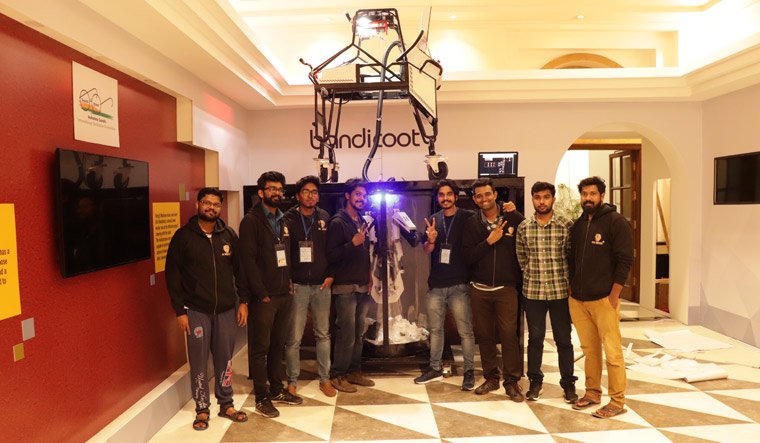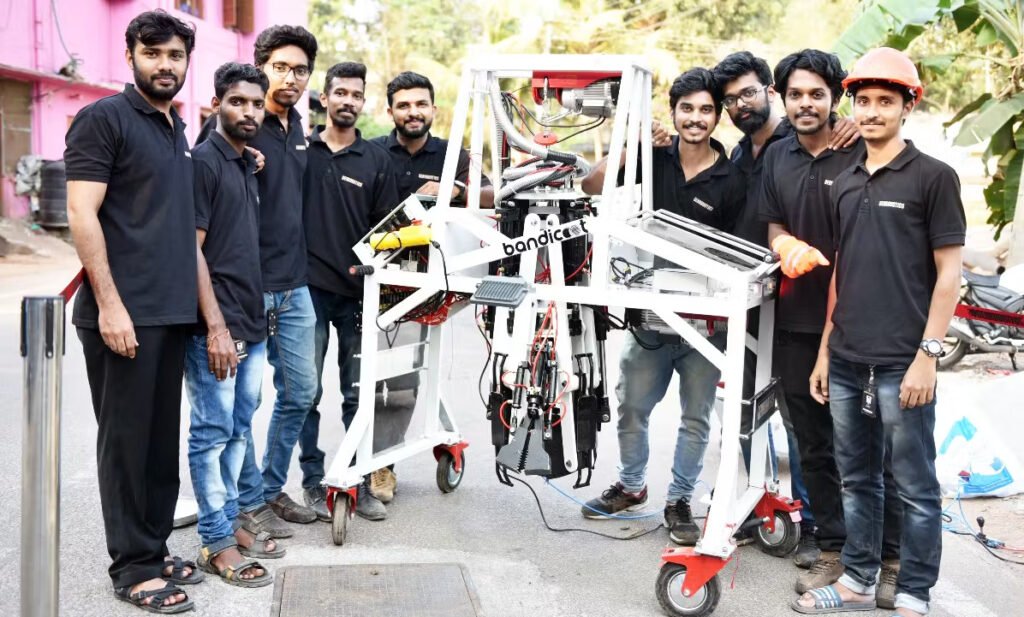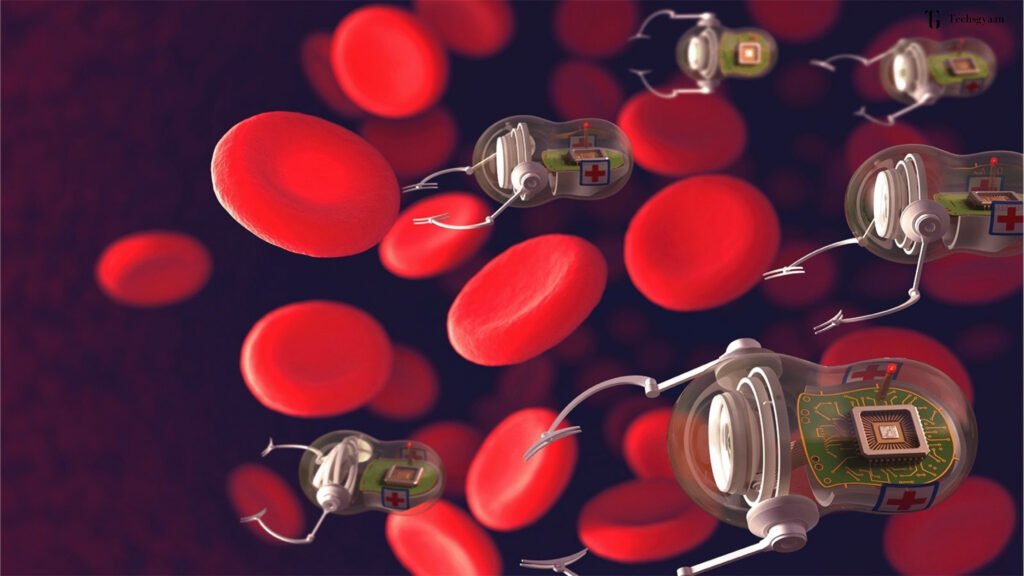
GenRobotics Innovations has developed Bandicoot, which is a robotic scavenger specially designed to clean manholes and sewers safely and efficiently. More than this it also provides robotic solutions for healthcare.
In 2016, a tragic incident in Kozhikode, Kerala claimed the lives of three innocent men while they were cleaning a sewer. This motivated a group of young engineers to use technology to address one of India’s most inhumane practices, manual scavenging.
Rashid K, Arun George, Vimal Govind MK, and Nikhil Np were already working on exoskeleton technology to develop robotics for wearable devices. But after the tragic incident took place, they were completely shocked and decided to eliminate manual scavenging with the help of Genrobotic Innovations, which was registered in 2017.
“Until then, we didn’t even know what a manhole was. In our village, there was no manhole system, only septic tanks. When we learned about this incident, we realised the scale of the issue and how deep the problem ran,” Rashid recalls.
But again working on such an innovative project was never an easy task and also the four friends from middle-class families had limited funds to develop a robotic innovation.
Back in 2017, they completed their professional course and were placed in top multinational companies. They approached the Kerala government and developed their first Proof of Concept (PoC), which is a wooden prototype funded by the Kerala Startup Mission (KSUM).
Through KSUM, they also received their first round of funding from Unicorn Venture Capital and refined their prototype into Bandicoot, launched by the Chief Minister of Kerala in 2018. Following this in the same year, version 2.0 of Bandicoot was launched in the presence of Prime Minister Narendra Modi and UN Secretary-General António Guterres.
Rashid elaborates, “Existing machines like suction systems or grabbers were ineffective because they couldn’t handle the solid waste or reach the corners of manholes. Bandicoot changes that by replicating human actions and cleaning efficiently.”
Follow Techsgyaan to get more robotics news.
What Is Bandicoot?

Bandicoot is a fully functional robot that is capable of mimicking human actions to clean manholes, it has four legs that provide stability inside manholes and its robotic arm collects waste from all corners and provides proper cleaning. More than this the robot features camera vision that enables the operator to see inside the manholes and a gas sensor that detects poisonous gases.
History of Bandicoot, From Manholes to Machine Holes
Bandicoot was first deployed in Kerala and soon spread across 19 states and three union territories. “Today, 300 Bandicoots operate 37 sites and have cleaned over 6,000 manholes. Our goal is to see it deployed in all 5,000 urban local bodies (ULBs) in India,” Rashid proudly states.
Genrobotics’ mission wasn’t just about replacing humans with robots, it was about transforming the lives of sanitation workers.
Rashid shares, “These workers are often marginalised and discriminated against. Our vision was two-fold: to end manual scavenging with robots and to rehabilitate sanitation workers as robot operators.”
To achieve this, the Thiruvananthapuram-based company developed a simple user interface for Bandicoot in collaboration with Google, ensuring even illiterate individuals could operate the robot.
Rashid emphasises, “We wanted sanitation workers themselves to operate the robots. This wasn’t just about technology but about empowering a marginalised community.”
Through collaborations with the Ministry of Social Justice’s NAMASTE (National Action for Mechanised Sanitation Ecosystem) initiative and the National Safai Karamcharis Finance and Development Corporation (NSKFDC), Genrobotics has trained over 3,000 sanitation workers so far, and transformed the roles of more than 1,000 workers into robot operators. Additionally, the team conducts workshops across India to educate workers about the dangers of manual scavenging and the benefits of robotics.
One of Genrobotics’ most profound contributions is the cultural shift they have inspired. Rashid recounts, “The term ‘manhole’ inherently implies that a man must enter. We wanted to challenge this mindset and initially suggested the term robohole.”
Last year, the Indian government officially adopted the term “machine hole,” a significant milestone in changing societal perceptions. Rashid reflects, “It’s a small but powerful step toward redefining how we view sanitation work and the people involved.”
Innovations Beyond Bandicoot
While Bandicoot is busy addressing manhole cleaning, Genrobotics has expanded its innovations in other critical areas as well, some of them including:
Wilboar: The term developed Wilboar to clean wells in sewage treatment plants (STPs), where waste accumulates at depths of 10-15 meters. Rashid explains, “Oxygen deficiency and poisonous gases make STPs extremely dangerous for humans. Wilboar eliminates the need for human involvement in these hazardous environments.”
G-Crow Application: The G-Crow application monitors manhole cleaning activities, tracks progress, and ensures accountability. Rashid explains, “It helps us manage data like cleaning frequency and locations, ensuring transparency and efficiency.”
G-Gaiter: The Custom-made G-Gaiter is specially designed to assist patients with stroke-triggered paraplegic conditions, traumatic spinal cord injury, cerebral palsy, accidents, and Parkison’s disease by increasing their mobility as well as consistency, besides the quality of gait pattern.
The AI-powered natural gait pattern of the robot aids the patient’s easy completion of 900 to 1,000 steps in 20 to 45 minutes.
Rashid describes its function: “For paraplegic patients, their brains forget how to walk. G-Gaiter uses a robotic exoskeleton on a treadmill to simulate walking movements, helping the brain relearn the process.”
The team recently launched a pediatric version of G-Gaiter that caters to children with mobility issues. “Small kids suffering from mobility challenges need support. Our pediatric G-Gaiter is designed to give them a chance at a better life,” adds Rashid.
Challenges and Milestones of Genrobotics Innovations
Since its creation, Genrobotics has won several prestigious awards, including the Swachhata Startup Award for the invention of the Bandicoot Robotic Scavenger, as well as the Amrut Tech Challenge Award for ‘Promising Innovative Solution’, and BIRAC Innovator Award for ‘Innovation with High Social Impact’.
Like any startup, Genrobotics has faced its share of challenges. Rashid recalls, “In the beginning, we struggled with funding. Then, we didn’t have an office or the infrastructure to scale. At each stage, we tackled new problems, whether it was sales or building a skilled team.”
The support of investors like Anand Mahindra and partnerships with government bodies have helped in overcoming these hurdles, he adds.
Genrobotics received seed funding from Rajan Anandan, Ex-Vice President, Google; Pre-series A Funding from Anand Mahindra, Chairman, Mahindra Group; and Series A Funding from – Sridhar Vembu of Zoho Corp.
With Bandicoot already gaining huge popularity, Genrobotics aims to expand its reach globally and address more real-life challenges and problems. Rashid visions a future where no human has to risk their life or dignity in sanitation work.
“In hardware startups, funding is critical. It’s not like software where you can scale easily. Every step requires significant resources. Apart from funding, we had to set up an office, our manufacturing unit in Kanjikode. Then, we were focused on raising more funds. Sales, human resources have all been challenges–typical of any scaling startup.”
“We want Bandicoot and our other innovations to be a part of every city in India and beyond. This isn’t just about technology—it’s about creating a world where dignity is a fundamental right,” he says.
Three Bandicoot robots are already working in the Mahakumbh to maintain cleanliness, which is the world’s largest spiritual and religious gathering in Prayaraj, Uttar Pradesh.
“The Maha Kumbh Mela is a sacred event that unites millions of people in faith and devotion. We feel privileged to play a role in ensuring the safety and well-being of the pilgrims. For us, this is more than technology—it’s a heartfelt offering to support the holiness of this incredible gathering,” says Nikhil.
As Rashid aptly concludes, “Technology is the key to solving some of humanity’s greatest challenges. But it’s the intent behind it that truly makes a difference. Our mission is to create a future where no one has to compromise their dignity or safety for their livelihood.”

